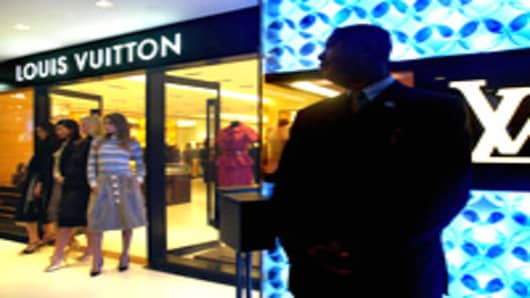Luxury experienced its worst slump in 2009 as the economic environment spurred even high-end consumers to purchase less and save more. While middle income consumers continue to spend cautiously, it appears the luxury consumer is back, and the big question is, can the luxury retailers continue to outperform and provide increasing profit for shareholders?
According to the latest date from Mastercard Advisors SpendingPulse, luxury sector sales are up 6.1 percent this January compared to last January. SpendingPulse's Luxury Index measures sales at department stores, general apparel categories as well as high-end restaurants and food stores.
The SpendingPulse data appears to be supported by the recent earnings reports and same store sales numbers for the world's luxury brands. LVMH Moet Hennessey Louis Vuitton, the world's largest luxury group, reported strong earnings Friday with strong profit due to increased demand for the company's products in China.
The luxury retailer recorded a 19 percent revenue increase for 2010, for the first time beating the 20 billion euro mark. The pre-tax profit was up 29 percent and in line with forecasts, though some analyst were disappointed, hoping LVMH would blow past estimates. LVMH shares however, have disappointed. LVMH lost 2.9 percent in Paris trading intraday Friday. The Parisian CAC 40 Index has posted 3 percent growth vs. LVMH's 2 percent decline since November.
Analysts at HSBC are looking for 11 percent growth in worldwide demand for luxury goods, boosted by demand in emerging markets. LVMH hopes to increase market share and global sales as it plans to expand in Mexico and Malaysia.
On Thursday, Hermes the maker of Birkin, Kelly handbags and famous silk scarves reported a 17 percent rise in fourth quarter revenue. Hermes also proposed paying an interim dividend of 1 euro per share, for the first time in its history, from its strong cash flows.
And it's not just the overseas-based luxury retailers making headlines. New York City-based iconic Estee Lauder posted strong earnings with a profit up 34 percent as it undertakes a new strategy of few but bigger product launches in tandem with administrative cost cutting measures. The maker of Clinique, MAC, Origins, Smashbox and Bobbi Brown cosmetic lines as it fights to hold onto its consumers in emerging markets as competition heats up.
For second quarter results released Thursday, Estee Lauder reported strong revenue numbers in Asia up 16 percent to $512 million, and revenue in Europe, the Middle East and Africa up 11 percent to $993 million. Estee Lauder's stock is trading up 17 percent for the week.
Elizabeth Arden reports second quarter profit up 61 percent, and boosting its full year view. Elizabeth Arden's financial strength came from its international markets, where sales jumped 12 percent compared to flat growth in North America. Elizabeth Arden's product lines vary from the high-end to the low-end, being sold at retailers from Neiman Marcus and Saks to Target and Wal-Mart. Shares of Elizabeth Arden were up more than 7 percent for the week.
Same store sales for January revealed mixed results for luxury department stores. Saks reported an increase of 4.4 percent, however the street was expecting closer to a 5.3 percent increase. While Nordstrom reported a strong 4.8 percent increase in same store sales for January surpassing the expected 1.4 percent jump.
Most analysts believe there is strength ahead for the luxury market, despite various downward pressures looming. The rising cost of cotton will certainly affect retailers, especially those that sell high cotton-content apparel, and oil and gasoline prices rising inevitably increases shipping costs.
Jan Kniffen of J. Rogers Kniffen believes that luxury will be best positioned to fight the headwinds of inflation. The lower cotton content and more economically-insulated consumer will continue to spend. Even if retailers pass along some of the costs, Kniffen believes the high-end consumer demand will continue to hold. As a result, he favors luxury retailers Saks and Nordstrom over other specialty retailers and department stores for investors.
David Abella of Rochdale, believes the consumer was back in 2010 for the holiday season particularly true for the higher end consumer and luxury retailers. "As the improvement gradually moves to the mid-income level, and given some improvement in the employment rate, the aspirational shopper should start to increase their purchases," he says.
However Abella acknowledges some of the aspirational demand is priced into luxury stocks like Tiffany and Coach, making them bit pricey, though Rochdale still likes and owns both. Overall, Abella says "while the stocks have paused a bit since Black Friday, we believe that they should do well as the economy continues to improve and even pick up momentum through the year."



